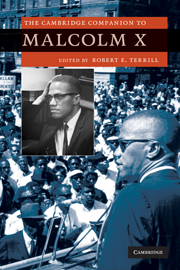Book contents
- Frontmatter
- Introduction
- 1 Malcolm X and Elijah Muhammad
- 2 Autobiography and identity: Malcolm X as author and hero
- 3 Bringing Malcolm X to Hollywood
- 4 Malcolm X and black masculinity in process
- 5 Womanizing Malcolm X
- 6 Malcolm X and the Black Arts Movement
- 7 Malcolm X and African American conservatism
- 8 Malcolm X and youth culture
- 9 Homo rhetoricus Afro-Americanus: Malcolm X and the “rhetorical ideal of life”
- 10 Judgment and critique in the rhetoric of Malcolm X
- 11 Nightmarish landscapes: geography and the dystopian writings of Malcolm X
- 12 Afrocentricity and Malcolm X
- 13 Malcolm X in global perspective
- 14 The legacy of Malcolm X
- Guide to further reading
- Index
14 - The legacy of Malcolm X
Published online by Cambridge University Press: 28 May 2010
- Frontmatter
- Introduction
- 1 Malcolm X and Elijah Muhammad
- 2 Autobiography and identity: Malcolm X as author and hero
- 3 Bringing Malcolm X to Hollywood
- 4 Malcolm X and black masculinity in process
- 5 Womanizing Malcolm X
- 6 Malcolm X and the Black Arts Movement
- 7 Malcolm X and African American conservatism
- 8 Malcolm X and youth culture
- 9 Homo rhetoricus Afro-Americanus: Malcolm X and the “rhetorical ideal of life”
- 10 Judgment and critique in the rhetoric of Malcolm X
- 11 Nightmarish landscapes: geography and the dystopian writings of Malcolm X
- 12 Afrocentricity and Malcolm X
- 13 Malcolm X in global perspective
- 14 The legacy of Malcolm X
- Guide to further reading
- Index
Summary
Malcolm X is important because his experiences are typical of the experiences that transformed African Americans in the twentieth century - the move from rural peasantry to industrial proletariat to postindustrial redundancy - all of which prepared them for a truly revolutionary role. He is one of the two most important black leadership figures in the second half of the twentieth century. Along with Dr. Martin Luther King, Jr., Malcolm X clarified the alternatives facing black people in the postindustrial period. Malcolm's intervention into the movement was primarily ideological. Tens of thousands of black people were energized by him to take action. He rearticulated their moods, feelings, and sensibilities in ways that helped them gain greater clarity as to who they were, what their problems were, and how they might go about building a movement to liberate themselves. He did this not through innovative thinking and ideas but through a down-to-earth rearticulation of the black radical tradition. / Exponent of the black radical tradition: ideology, culture, and class / The black radical tradition had roots in nineteenth-century Pan-Negro nationalism, twentieth-century Pan-Africanism and Garveyism, and the class struggle approach of the African Blood Brotherhood. Malcolm X came to understand more perfectly this black radical tradition in the last eleven months of his life.
- Type
- Chapter
- Information
- The Cambridge Companion to Malcolm X , pp. 171 - 184Publisher: Cambridge University PressPrint publication year: 2010



